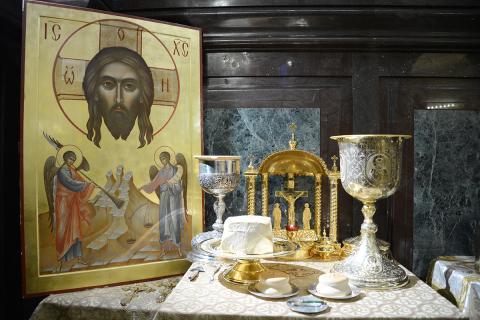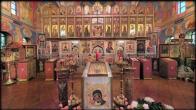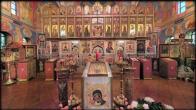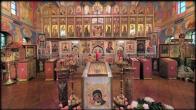You are here
Notes on the Liturgy & the Church

by Sergei Fudel
Chapter 3
The Church is God's creation, but one whose acquisition is not given to a poisoned mind, for through the Divine Incarnation, it is "raised up above the Heavens."
The Saints often point out that we have an inborn knowledge of the heavenly realm: "The names of some of the [heavenly] powers have not yet been announced to us, and are as yet unknown." (St. John Chrysostom). St. Symeon the New Theologian also wrote of the "creations as yet unknown to us." There are creations that are "known" and those that are "unknown." But we stand before the "known," as if before the Church, as on the threshold of another world.
What is the meaning of Christ's words about His humanity, "And unto the angel of the church of the Laodiceans write: These things saith the Amen, the faithful and true witness, the beginning of the creation of God…" (Revelation 3: 14)? Why to the Church of Laodicea, i.e. to the last in the history of the Church, to the one, according to the Word of God, burdened with a conceited and indifferent external appearance? Does it need that reminder of God's human flesh, self-sacrificing and suffering, weak and victorious and raised up above the Heavens - that Flesh thanks to which humanity [could find] salvation in the Church, becoming the Body of God?
St. John Chrysostom writes, "As Adam's wife was created while he was asleep, so during Christ's death, from His rib the Church took shape... As a groom, having left his father, comes to his bride, so Christ, having left the Father's Throne, came to His Bride… This is why the Apostle says, "This is a great Mystery… for I speak of Christ and the Church." He writes in his talks on the Epistle to the Ephesians that God raised her (the Church - S.F.) to a great height, and placed her on that same throne, for where the Head (Christ - S.F.) is, so is the Church there is no break between the Head and the Body. <...> Lest on hearing the word "head," you not see its meaning as simply "authority," but see its actual meaning, lest you not merely consider Him the leader, but see in Him as it were, a real physical head, the Apostle adds, "[the Church is - S.F.] the "fulfillment of the One Who fulfills all in all..."
The Church is the fullness, the fulfillment of Christ, just as the head is fulfilled, completed, by the body and the body fulfilled, completed, by the head. Commenting on the same Epistle, Blessed Theophylact writes "The formerly scorned race of man took its place higher than any Angelic power. God placed the Church on the same throne, because where the head is, so is the Body…and the Church is His fullness, for as the body is the fullness of the head, making it complete, so the Church is the fullness of Christ, for Christ is filled in, as it were made complete, by all of the members (of His Body) in the persons of all of the faithful." "It was for this reason that He mixed Himself with us and dissolved His Body in us, so that we might comprise some single thing, like a body, connected to the head. And that is a sign of the most powerful love." (John Chrysostom).
No matter how long we might stand with our candle at the shore of that sea of knowledge of those mysteries, the only thing we can see is the impossibility of separating in any way, be it conditionally or in a methodological manner, the Church from Christ. Any such division is a splitting of the divine-human nature of Christ, i.e. something encroaching on the very basis of Christianity. "God appeared in the flesh." The Divine united with the human, and that ineffable union is called the Church. "You are the Body of Christ,' writes the Apostle (I Corinthians 12: 27). “I am the vine, ye are the branches." (John 15: 5), i.e. the Church. St. John of Kronstadt writes, "It is because the Lord is holy, that the Church is holy." "…for the Church is one with the Lord, is '…His Body, of His Flesh and of His Bones…'"(Ephesians 5: 30).
Never imagine the Church separate from the Lord Jesus Christ, or from the Father and the Holy Spirit. Great and most honorable is the body of the Holy Church.” The inseparability of the Church from Christ is revealed to us in another way. It is the literal image of the 'sign" [Icon] of the Theotokos. On it, Christ is depicted in His mother's womb, in the bosom of the Mother of God; God is not only depicted in the flesh, but surrounded by the flesh of the Most-pure Virgin. At the Liturgy, that 'sign" is made in each true communicant of the Mystery. St. Symeon the New Theologian writes, "God the Word of the Father enters into us, as into the womb of the Ever-Virgin. We receive Him, and He abides in us, like a seed. Hearing of that awesome Mystery, be affrighted… Thus we likewise conceive Him: not bodily, as the Virgin and Theotokos Mary did, but spiritually. "We have this treasure in earthen vessels…" (II Corinthians 4: 7). He [Ap. Paul - Ed.] calls the Son of God a treasure, Whom we have in our hearts.
As it is impossible for Him to again be incarnate, be physically born in each of us, He gives to us in the Mystery that very same most-incorrupt Flesh which He took on from the Most-pure Theotokos Mary; in consuming It, we - of course those who worthily commune - have It, the fullness of Incarnate God, within us.... In his own words, "He that eateth My Flesh, and drinketh My Blood, dwelleth in Me, and I in him." (John 6: 56). Moving in to us, He, incorporeal, is within us, and ineffably unites with our matter, and deifies us; for we share in His Body, being flesh of His Flesh and Bone of His Bones. And this is precisely the great fruit of our Lord's ineffable construction of His House, and His condescension to us!"
Through Communion, not only our soul, but also our body begins its Eternal Life, its incorrupt Pascha. "To receive the Eucharist is to receive the teaching of deification of the flesh." (Archimandrite Cyprian Kern). This is the completion of the "little church" of the separate individual, of which Makarios the Great writes, the little cell of the Universal Church Body. "Communing of the Body and Blood of God, you are also one Body with Him, and are dissolved in and merged with His Blood." (Ven. St. Theognost). "Having partaken of the Body and Blood of Christ, you will be of one Body and Blood with Him. For thus we are Bearers of Christ, sharing His Body and Blood." (St. Cyril of Jerusalem.) As it is impossible to separate the Church from Christ, so it is impossible the Liturgy from the reality of our entry into the World of the Divine.
PARISH LIFE
RECENT VIDEOS
Address of our Cathedral
Subscribe to our mailing list
While all the materials on this site are copyrighted, you may use them freely as long as you treat them
with respect and provide attribution on the Russian Orthodox Cathedral of St.John the Baptist of Washington DC.









